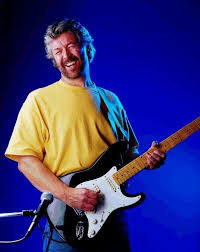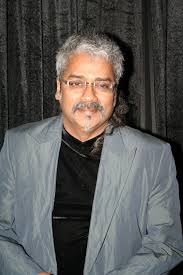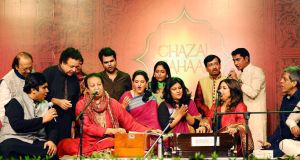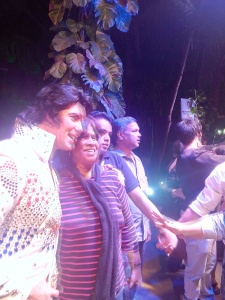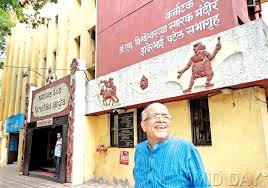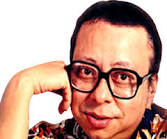
RAHUL and Dev have been named for obvious reasons. Their fathers have been the best of friends, and both grew up on Rahul Dev Burman. The age gap between the two is five months, with Rahul being elder. And both of them have been fans of Pancham, or RD, since childhood.
Now in their early 30s, Rahul and Dev stay in different corners of Mumbai. Yet, they meet at least twice a year – on June 27, RD’s birthday, and January 4, his death anniversary. Each time, they choose a different theme, and play those songs on the music system. On his birthday last year, they tripped on RD’s songs with lyricist Anand Bakshi. In the session before that, they covered his songs with Kishore.
This year, on RD’s death anniversary today, they wonder what to do. They meet at Dev’s place in Belapur, Navi Mumbai. Rahul had a business appointment in Vashi, but has to leave early to catch a flight. Since time is limited, Dev suggests a quick antakshri of a maximum of 20 songs, preferably only the first line or mukhda. As all antakshris begin with the letter ‘M’, he asks Rahul to begin. This is how it goes:
Rahul: One of my favourites from Kishore. Mere naina saaawan bhaadon, phir bhi mera man pyaasa, phir bhi mera man pyaasa. Dev, start with ‘S’.
Dev: Saagar kinaare, dil yeh pukaare, tu jo nahin hai mera, koi nahin hai.. Aah, Dimple looked gorgeous. But I am Rishi, and you are Kamal. The letter ‘H’.
Rahul (playing an air guitar): Humne tumko dekha, tumne humko dekha, kaise? Hum tum sanam, saaton janam, milte rahenge, aise. ‘S’ again’
Dev (clears throat to sound like four people singing together): Saare ke saare ga ma ko lekar gaate chale, saare ke saare ga ma ko lekar gaate chale… (hums dhi-jhi-jhin-jhin-jhi-jhin jhin for the music).. Sing with ‘L’
Rahul: I loved the Yaadon Ki Baaraat music. (Begins dancing) Lekar hum deewana dil, phirte hain manzil manzil, kahin toh pyaare, kisi kinare, mil jaao tum andhere ujale, ta-ra-tar lekar hum. Start with ‘M’
Dev: Remember Jalal Agha and Helen? (clears throat to deepen his voice) Mehbooba mehbooba, mehbooba mehbooba, ooo-oooo, gulshan mein phool khilte hain, jab sehra mein milte hain, mein ur tu. Of course, the song was lifted from Demis Roussos’ ‘Say you love me’. (Sings that too to prove it) Your chance ‘T’, from ‘tu’
Rahul (showing his mastery over an imaginary sitar): Tere bina zindagi se koi shikwa toh nahin, shikwa nahin, shikwa nahin, tere bina zindagi bhi lekin, zindagi toh nahin, zindagi nahin, zindagi nahin.. It’s ‘nahin’. So take either ‘H’ or ‘N’.
Dev: Humein tumse pyaar kitna, yeh hum nahin jaante, magar jee nahin sakte tumhare bina-a-a, yeh dil beqarar kita yeh hum nahin jaante, magar jee nahin sakte tumhare bina… Tumhein koi aur dekhe… I wish I could sing the whole song, but take ‘N’ for ‘tumhare bina’
Rahul: Nadiya se dariya, ta-tang, ta-tang, Dariya se saagar, doo-do-doo-do, saagar se gehra jaam, oh ho ho jaa-aam mein doo-oob gayee hai yaaron jeevan ki har shaam.. ‘M’ for you, Dev. (Still humming ‘Kisiko daulat ka nasha..’)
Dev: Mere saamne waali khidki mein ek chaand ka tukda rehta hai, afsos yeh hai ko woh humse kuch ukhda ukhda rehta hai.. Your turn for ‘H’.
Rahul: Hum donon do premee duniya chhod chale, jeevan ki hum saari rasmein tod chale, babul ki aaye mohe yaad, jaane kya ho ab uske baad… Too much ‘H’ and M’ so far. Try ‘D’.
Dev: (Continuing with ‘jhumna jhumna’ from the previous song and mimicking a train whistle) Stop dreaming of Zeenat, Rahul. You’re my friend, na? Diye jalte hain, phool khilte hain, badi mushkil se magar, duniya mein dost milte hain, aahaha, diye jalte hain.. There we go again.. ‘H’ or N’.
Rahul: Huzoor is kadar bhi na itaraate chaliye, khule aam aanchal na lehraa ke chaliye.. ‘Y’ for you
Dev: This song was written for the two of us, so sing it with me. I Kishore, you Manna De.. for me, always easier to sing Kishore than Manna. Yeh dosti hum nahin todenge, todenge dum magar, tera saath na chhodenge.. (Produces mouth organ sound) Sing in ‘G’. The letter, not the key
Rahul: You get all the dosti songs. I get the Rekha songs. Ghum ho kisike pyaar mein, dil subah shaa-aa-am, par tumhe nahin likh paaon, mein uska naam, haay Ram, haay Ram… too-roo-doo, too-roo-doo.. ‘M’
Dev: A classic. (clearing his voice to sound like Asha Bhosle) Mera kucch saaman tumhare paas pada hai, o o saawan ke kuch bheege bheege din rakhe hain, aur ek khat mein ik liptee raat padee hai, woh raat bhula do, mera kuch saamaan lauta do. Under one lonely umbrella, when we were getting half-half wet, half-wet, half-dry, I had got the dryness to you. Start with ‘D’. Four songs to go.
Rahul: I will sing, but can you explain the meaning of the Ijaazat song first? That ‘Ek akeli chhatri mein’ line you just translated. Apparently, even RD didn’t know what it meant when he composed it. Ha ha, or even the one I am about to sing with ‘D’. Anyway, here goes.. Do naina aur ek kahaani, thoda sa baadal, thoda sa paani, aur ek kahaani. ‘N’ for you
Dev: Ni sultana re, pyaar ka mausam aaya. Bolo na bolo mukh se gori chudee tumhaar bole, Yahee batiya sun sunke jeeya mora dole, o ni sultana re.. But I prefer ‘Tum bin jaaon kahan’ from this film. For the last round, you have ‘R’
Rahul (pretending to ride a motorcycle): Rote huye aate hain sab, hanstaa hua jo jaayega, woh muqaddar ka sikandar
Dev: Stop cheating. That’s Kalyanji-Anandji, not Pancham
Rahul: (trying to cover up the fact that he had goofed up). Hahaha. Was just testing your alertness. Roz roz ankhon tale, ek hi sapna chale, raat bhar kaajal jale, aankh mein, jis tarah khwaab ka diya jale-e-e-e, Roz roz ankhon tale.. Yup final song,.. In ‘L’
Dev (clears throat to make his voice sound childlike): Lakdi ki kaathi, kaathi pe ghoda, ghode ki doomb pe maara hathoda, dauda dauda dauda ghoda doomb utha ke dauda. Hurrrr! Wow! What a game we played..
—
The game over, another round of tea is ordered. The two friends continue talking.
Rahul: What a time we had. And guess what! Main bach gaya. If you had sung ‘Lakdi ki kaathi’ earlier, you’d have asked me to sing in ‘Da’. And the only two songs I know in ‘Da’ are ‘Dum dum diga diga’ by Kalyanji-Anandji and ‘Dafli waale’ by Laxmikant Pyarelal.
Dev: I wouldn’t even remember those. But know what? Most music directors composed tunes using the ‘da-da-dee-da’ style. So I would sing ‘Da da dee da, dee dee da da, dada dee dee dee dee daa dey’ to the tune of ‘Panna ki tamanna hai ke Heera mujhe mil jaaye’
Rahul: Heera toh pehle hi kisi aur ka ho chukka, kisiki madbharee aankhon mein kho chuka…
Dev: Yaadon ki dastoor, ban chuka dil ka phoo-oo-ool.. (Banging the table like bongos).. Da da dee da, dee dee da da, dada dee dee dee dee daa dey
Rahul: Dee dee daa dee, de de de da… But lots of letters never came. I was waiting for ‘O’ to sing ‘O mere dil ke chain’, ‘O meri soni meri tamanna’, ‘O hansini’ and ‘O Maria’
Dev: I wanted ‘K’. ‘Kuch toh log kahenge’, ‘Kiska raasta dekhe’, ‘Karwate badalte rahein’, ‘Khulam khula pyaar karenge’, ‘Katra katra’
Rahul: You got ‘M’ so many times. Was worried you would sing ‘Main shaayar badnaam’. I adore the song, but when you sing it, you just don’t stop.
Dev: Aaah, I remember it only after a few drinks down. (Clearing his throat to get the Kishore pathos timbre) Rasta rok rahi hai, thodi jaan hai baaki, jaane toote dil mein, kya armaan…
Rahul: Okay, okay, okay, Got it. Ab tumko mera salaam. Main chala, main chala. We covered quite a bit. Time to leave for the airport. See you on June 27.
Dev: Yes see you. Have a great trip. You have a long drive. Hope you have some good music to play.
Rahul: Don’t worry. Stay online. We shall continue our Panchamakshari on WhatsApp. Today we can do anything with our mobile phones. Why not do something constructive for Pancham-da?
Dev: Hahaha: Jai Pancham… Let’s continue with the game. But instead of starting with ‘Ma’, let’s start with ‘Pa’. ‘Pa’ for Pancham. Don’t start with ‘Panna ki tamanna’.. we just sang that. And please don’t cheat using Google! Bye!
